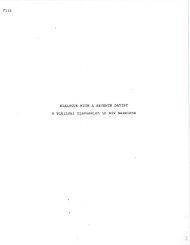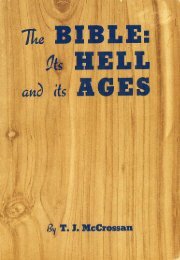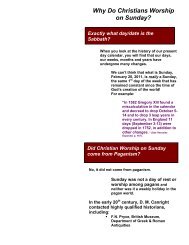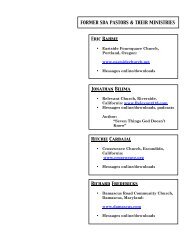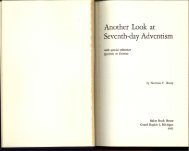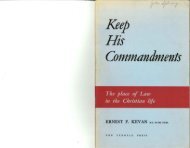Discovering the New Covenant by Greg Taylor - exAdventist Outreach
Discovering the New Covenant by Greg Taylor - exAdventist Outreach
Discovering the New Covenant by Greg Taylor - exAdventist Outreach
You also want an ePaper? Increase the reach of your titles
YUMPU automatically turns print PDFs into web optimized ePapers that Google loves.
THE SABBATH IN ACTS<br />
Without circumcision <strong>the</strong>re was no obligation to <strong>the</strong> rest of<br />
<strong>the</strong> law. This is why circumcision was <strong>the</strong> issue that was so<br />
hotly debated. Sabbath observance was not expected of <strong>the</strong><br />
uncircumcised, non-Jewish community around <strong>the</strong>m.<br />
The rules regarding Sabbath involved not carrying a<br />
burden, not building a fire, not traveling, and of course, not<br />
working in any way on that day. This was to apply to <strong>the</strong><br />
Jews and also to <strong>the</strong> stranger within <strong>the</strong>ir gates or <strong>the</strong>ir<br />
households. It was not applicable to <strong>the</strong> strangers who<br />
"sojourned among <strong>the</strong>m.” Only those within <strong>the</strong>ir gates were<br />
required to keep Sabbath. There were also <strong>the</strong> food laws and<br />
<strong>the</strong> laws of uncleanness that were part of this system and<br />
marked <strong>the</strong> Jews as separate from <strong>the</strong> rest of <strong>the</strong> world<br />
around <strong>the</strong>m. It is clearly <strong>the</strong>se requirements that Peter was<br />
referring to as a burden too heavy to bear.<br />
In Acts 15 <strong>the</strong> church leaders came to a solution. They<br />
decided not to place on <strong>the</strong> new converts any of <strong>the</strong> specific<br />
regulations that were part of <strong>the</strong> covenantal system of<br />
Judaism. They did not require <strong>the</strong> entrance sign, so <strong>the</strong> rest<br />
of <strong>the</strong> laws would not apply ei<strong>the</strong>r—just as today we do not<br />
require someone who is not baptized to follow all <strong>the</strong><br />
guidelines of a particular church. The regulations that <strong>the</strong>y<br />
did require had <strong>the</strong>ir origins in <strong>the</strong> Noahic covenant (see<br />
Gen. 6-10, which included worship of <strong>the</strong> true God, avoiding<br />
things strangled, blood, and sexual immorality). These were<br />
considered <strong>by</strong> Jews everywhere to be required of all people<br />
since <strong>the</strong> covenant with Noah applied to all humans.<br />
Leviticus 17-18 expands on <strong>the</strong>se and defines what is meant<br />
<strong>by</strong> <strong>the</strong>se regulations. In each case in Leviticus 17-18, it is<br />
made clear that <strong>the</strong>y are binding on <strong>the</strong> "stranger that<br />
sojourns among you.” (Notice <strong>the</strong> clear distinction between<br />
this group and <strong>the</strong> "stranger that is within your gates.")<br />
Notice also Acts 15:20 where <strong>the</strong>se regulations are<br />
considered binding on <strong>the</strong> new converts. The reason being<br />
that <strong>the</strong>re were Jewish people in every city who read <strong>the</strong> Law<br />
of Moses each Sabbath, and <strong>the</strong>y would expect someone who<br />
91



